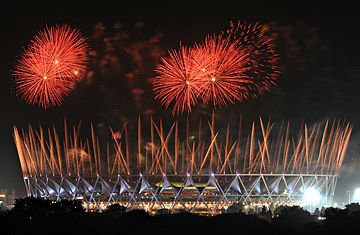
The opening ceremony of the Commonwealth Games in New Delhi, Oct. 3, 2010
Every athlete knows that it's not how you start the race that counts but how you finish it. Midway through the Commonwealth Games in New Delhi, Indians are hoping the same proves true for the host nation.
The run-up to the Games — the quadrennial, Olympics-like event for members of the erstwhile British Empire — wasn't pretty. When India was awarded the right to host the event seven years ago, it was viewed as a chance to showcase the country's new economic dynamism, and organizers promised that the event would rival the splendor of the Beijing Olympics. But, as the Games drew closer, preparations languished, allegations of mismanagement and corruption grew louder and a number of countries warned that accommodations for their athletes were so dire that they might withdraw their teams. As participants from the 71 competing nations began arriving, the Games Village designed to house some 6,000 competitors was still unfinished and in disrepair. A footbridge connecting the Village to the Games' main stadium collapsed, setting off a firestorm of criticism about corners that had been cut. There were also fears of a dengue-fever outbreak hitting the athletes. Several top athletes pulled out of the event citing the disarray and security concerns, and for a few days, the fate of the event itself appeared to hang in the balance.
India breathed a collective sigh of relief when the curtain rose on the Games' lavish opening ceremony on October 3. More than halfway through the even, despite some lingering logistical hiccups, the spotlight — and the controversy — has shifted from the organizers to the athletes. On Monday, Nigeria's Oludamola Osayomi, winner of the gold in the women's 100 meter event, was found to have tested positive for a banned substance. Still, for the most part, pessimism has given way to cautious optimism. "It was such a massive downer that everyone got caught up in the negativity for a while," says Mohit Jayal, managing director of the advertising firm Wieden+Kennedy Delhi. "But there is a genuine middle-class desire to make it succeed, despite the problems."
Around the venues that dot the city, thousands of Games volunteers and staff help guide visitors, officials and athletes. The city's landscape has been brightened, new metro lines ferry tourists and locals around the city, public spaces have been manicured and tourist hot spots polished.
Despite the improvements, the biggest concern about the Games has always been security. With people skittish after the 2008 attacks in Mumbai, the frenetic final weeks of preparation only heightened those concerns. "The principal concern was the delay in handing over the venues," says Ajai Sahni, executive director of the Institute for Conflict Management. "Instead of putting in place a security system that would have taken two or three months, now they're using pure saturation and obstruction to prevent an attack."
Throughout the capital, the buzz of Games activity happens under the watchful eye of 100,000 armed officers that line the streets, frisk spectators and inspect cars going into and out of the city's markets. The overwhelming presence of security makes terrorist strikes hard to execute, but the heavy-handed approach has a downside, says Sahni. "It will be successful in preventing an attack, but it also creates a great deal of inconvenience."
To combat the seriousness and hassle of the security detail, the city is plastered with billboards of the Games tagline, "Come out and play." Attendance, however, has been far from capacity. When the tennis competition got under way last week, only several dozen of the stadiums' 5,000 seats were occupied. Some events, like swimming, have been a bigger draw, but filling the stadiums has been a challenge.
Admission prices also excluded many Indians, prompting organizers to begin giving away free tickets to boost attendance. It's still not clear whether the Games will bring in enough dollars to make it a worthwhile investment. Despite reports of lower-than-expected tourist numbers — due in part to the bad publicity before the event — Debojyoti Sengupta, the joint director of the Indian Chamber of Commerce, anticipates that the event will double India's tourist revenue from last year.
As the Games head into the home stretch, India trusts a strong finish will make a more lasting impression than its slow start. Jayal hopes the final week builds positive momentum but expects that the benefits of playing host could come much later. "One of the turning points will be if people look back and say, let's not do it that way again, let's do it the right way," says Jayal. "That may be the biggest positive out of this."
